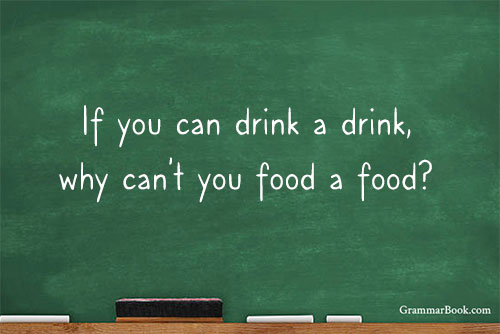|
Having trouble viewing this message? Click here to view it online.
To unsubscribe or change contact details, scroll to the bottom and follow the link.
|



|
|
Apocope Definition and Examples
|
|
We often use language techniques and functions in our writing and speech with such familiarity that we might not even know what they are nor what we're applying.
As one more-recognizable example, when we merge will with not to form won't, we are contracting the words.
Another operation we use with instinct but perhaps not always awareness is what is known as apocope (uh-POK-uh-pee). Originating from Greek for "to cut off," apocope is the omission of one or more letters, sounds, or syllables from the end of a word.
This end-cutting can take different forms. For instance, in Old English (before 1100 A.D.), our language included singan; today, we use the word sing. Old English also used lufu (noun) and lufian (verb) until undergoing apocope to arrive at the word love we have today.
In Middle English (1150–1500 A.D.), words such as root and sweet were pronounced with a final e, but as English continued evolving, these final vowels were dropped. Although archaic, examples of similar words that have survived apocope from the Middle Ages into the present are olde and shoppe.
Yet another instance of apocope through the centuries is the transformation of the proto-Germanic landa into land that has been used through Old, Middle, and Modern English (the era beginning in the sixteenth century).
Other apocopations can be altered word endings, such as chile instead of child in certain dialects of the American South and barbie instead of barbecue in Australia.
More Apocope Examples
Apocope is common in American English. Now that you know what it is, you may find yourself noticing apocopated words more often.
For example, the word photo is an apocope of photograph. Other examples are cinematograph > cinema, obituary > obit, zoological (garden) > zoo, and advertisement > ad.
The shortening of people's names is another form: Jonathan > Jon, Robert > Rob, Diana > Di.
In prose and poetry, you might see apocope as the intentional dropping or contraction of letters to satisfy meter, rhythm, or form: e.g., tho for though, oft for often.
Still another instance of apocope can be when sounds are dropped from the end of words as we pronounce them: e.g., mos for most, fo sho for for sure. This tends to be more common in slang and regional dialect.
Examples of Apocope in Other Languages
Even those who don't fluently speak a language other than English can recognize and understand how apocope shapes foreign words as well.
For example, the Latin mare drops the final e to make the Spanish and Portuguese mar (sea). Those who are familiar with how French sounds when spoken will recognize how it often suppresses final consonants to make a nasal sound, as in liaison and garçon.
Some languages also will apocopate words to satisfy grammatical functions. For instance, in Spanish some adjectives will drop their final vowel or syllable if they appear before a noun or describe another adjective.
Examples
bueno (good) > Qué tengas un buen día (Have a good day)
tanto (so much) > Ella es tan simpática (She is so nice)
tercero (third) > La oficina está en el tercer piso (The office is on the third floor) |
Related Topics
Clipping Syllables to Sizes We Like
The Diversity of American English Dialects
Abbreviations vs. Acronyms vs. Initialisms
|
View and comment on this
article on our website.
|
|
|

|
Pop Quiz
Identify any words that show apocope in the following sentences. If a sentence has no apocopated words, identify "none."
1. Jolee is going to the gym after school.
2. The famous rapper is now on the mic.
3. Steph, would you please repeat the question?
4. The lead guitar player forgot to bring his amp.
5. Georgia is their favorite state to visit.
|
 |
The Blue Book of Grammar and Punctuation
by Lester Kaufman and Jane Straus |
The Authority on English Grammar! Twelfth Edition Now Available
An indispensable tool for busy professionals, teachers, students, homeschool families, editors, writers, and proofreaders.
Available in print AND as an e-Book! Over 2,000 copies are purchased every month!
To order the book, simply click the link to order the book from the GrammarBook.com website.
|
Free BONUS Quiz for You!
Friend, because you are a subscriber to the newsletter, you get access to one of the Subscribers-Only Quizzes. Click here to take a Writing Numbers Quiz and get your scores and explanations instantly!
We will be adding many more quizzes this year to our already substantial list of them. If you have suggestions for topics we have not yet covered, please send us a message at help@grammarbook.com.
|
Hundreds of Additional Quizzes
at Your Fingertips
Subscribe now to receive hundreds of additional English usage quizzes not found anywhere else!
Teachers and Employers
Save hours of valuable time! You may assign quizzes to your students and employees and have their scores tallied, organized, and reported to you! Let GrammarBook.com take the hassle out of teaching English!
"Fun to test my skills."
"The explanations really help ... thanks!"
"I can select the quizzes to assign to my students, and then the results are reported to me automatically!"
If you think you have found an error in a quiz, please email us at help@grammarbook.com
|
Wordplay

Pop Quiz Answers
1. Jolee is going to the gym after school. gymnasium
2. The famous rapper is now on the mic. microphone
3. Steph, would you please repeat the question? Stephen, Stephanie
4. The lead guitar player forgot to bring his amp. amplifier
5. Georgia is their favorite state to visit. None
|
 |
English In A Snap:
68 One-Minute English Usage Videos FREE |
Learn all about who and whom, affect and effect, subjects and verbs, adjectives and adverbs, commas, semicolons, quotation marks, and much more by just sitting back and enjoying these easy-to-follow lessons. Share them with your colleagues (and boss), children, teachers, and friends as well! Click here to watch.
|
|